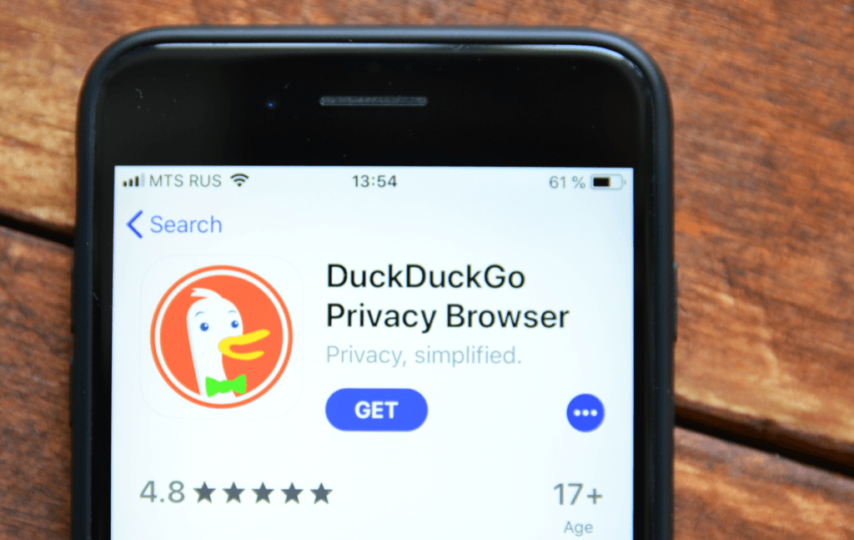A Web Search Engine With Morals?
DuckDuckGo started in 2008 with ambitious goals: providing private web search without tracking its users. A noble quest in the dangerous lands of data mining and surveillance.
This scrappy underduck sought to take on the big bad data-hungry giants like Google. With its trusty algorithms and spunky attitude, DuckDuckGo aimed to change web search for the better. No more looking over your shoulder as search engines track your every query!
But is DuckDuckGo the valiant knight-errant it claims to be? Or does a more sinister data devil hide beneath its moral armor? Cue dramatic music
Its Fall From Grace
DuckDuckGo faced scrutiny in early 2022 when it was discovered to be permitting Microsoft trackers, causing astonishment among users. Despite its long-standing advocacy for online privacy, DuckDuckGo collaborated with Microsoft to enable data tracking on its mobile browser. A deal with the tracking devil that quickly sparked controversy.
Many saw this sneaky move as a betrayal of DuckDuckGo’s core promise – to never track users. The underduck had fallen off its moral high ground, shaking user trust to the core. After intense public backlash, DuckDuckGo ended the Microsoft deal and said tracking would cease.
The Lingering Privacy Doubts
Though DuckDuckGo backpedaled on the Microsoft debacle, concerns remain about its privacy practices.
Targeted advertising: While DuckDuckGo claims not to profile users, its advertising uses search queries to target relevant ads. Is this still tracking by another name?
Data sharing: DuckDuckGo relies on data from sites like Wikipedia and Amazon for instant answers, exposing search queries to them. Does this violate user privacy?
Affiliations: By using Chromium, DuckDuckGo inherits any data sharing with Google set by default. Can an independent DuckDuckGo exist using Chromium?
Government coercion: As a U.S. company, DuckDuckGo could be forced to hand over user data under national security orders. How can privacy be guaranteed under such conditions?
Blind trust: DuckDuckGo’s email and browser extension services require trusting its servers and code without independent audits. Users must take DuckDuckGo’s privacy at face value.
Is DuckDuckGo As Bad As Google?
Ultimately, DuckDuckGo is probably a superior choice for privacy compared to surveillance-oriented entities such as Google. But it may not be as squeaky clean as its polished privacy image suggests.
Here are some thoughts on where DuckDuckGo stands on the data tracking spectrum:
It’s not as blatantly bad as Google or Facebook which track every move.
But it’s also not as committed to anonymity as Tor or hardcore privacy tools.
DuckDuckGo sits somewhere in the middle – better than the worst offenders but not perfect.
For the average user, DuckDuckGo provides “good enough” privacy for general web searches.
But those wanting robust privacy should look beyond DuckDuckGo to more secure options.
So while DuckDuckGo may not be a privacy paragon, it’s probably not a data demon either. Think of it more like a web search company trying to balance user privacy with running a profitable business model.
Not amazing, not terrible…just okay. Cue DuckDuckGo shrug
Protect Yourself With These Privacy Tips
If you opt for DuckDuckGo but desire additional privacy enhancements, consider the following suggestions:
Employ a VPN to encrypt your traffic and conceal your IP address.
Install browser extensions such as uBlock Origin to thwart trackers.
Enable HTTPS Everywhere to force sites to use secure HTTPS connections.
Use the Tor browser when you want anonymous untraceable browsing.
Disable scripts and cookies in your browser if you want to limit tracking.
Shop with privacy-focused online retailers when possible.
Read up on digital security basics to better protect your data.
Minimize personal info shared online and use alias emails when possible.
Take your privacy into your own hands! Don’t rely solely on any company or service to protect you.
The Moral of the Story
While DuckDuckGo may not be perfect, it offers a reasonably private web search option for the average user. But true online privacy requires effort on your part as well.
So don’t blindly trust any product or service to safeguard your data. Take control of your privacy as much as possible. And may online anonymity live happily ever after!
Conclusion: Why DuckDuckGo Is Bad?
Ultimately, DuckDuckGo continues to stand as a feasible choice for individuals seeking to safeguard their online privacy while utilizing a reliable search engine. Although it may not possess the extreme level of anonymity found in certain tools, it presents a commendable intermediary option compared to the data-collecting behemoths.
For many, DuckDuckGo hits the sweet spot between convenience and privacy. Its missteps show it is still a business with contradictions, but its continued commitment to user privacy cannot be entirely dismissed either.
Perhaps we should judge DuckDuckGo not by the purity of its morals, but by how its practices compare in the messy real world. And in that world, DuckDuckGo still comes out looking pretty darn good.
Online privacy remains more an art than a science. There are always trade-offs between usability and anonymity. Rather than search for a flawless solution, we must make informed choices given available options.
In that light, DuckDuckGo is far from perfect, but still a decent option for those who want more privacy without sacrificing search quality. No tool alone can guarantee total anonymity, but DuckDuckGo is bringing us a few steps closer – warts and all.
So while privacy purists will continue avoiding DuckDuckGo, it remains in a better place than most competitors who don’t even try to protect user data. Perhaps we should judge services by their direction more than their destination. And by those merits, DuckDuckGo still comes out quacking…though ruffled and imperfect.
FAQs: Why DuckDuckGo Is Bad
Q1: What is DuckDuckGo?
DuckDuckGo functions as a privacy-oriented search engine that refrains from tracking or profiling its users. It presents itself as a morally sound substitute to search engines like Google, which extensively monitor user activity.
Q2: Is DuckDuckGo private?
DuckDuckGo does not link searches with IP addresses and eliminates identifiers after every search session. However, concerns have been raised regarding third-party trackers and personalized advertisements. Although DuckDuckGo offers greater privacy than Google, it may not deliver the same degree of anonymity as tools such as Tor.
Q3: What should I know before using DuckDuckGo?
DuckDuckGo provides decent privacy for the average user. However, it cannot guarantee full confidentiality, and you must trust DuckDuckGo’s practices. For maximum anonymity, additional tools like VPNs and Tor may be needed.








